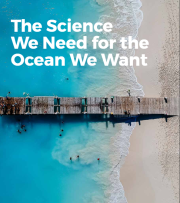More than forty experts from countries and international organizations in the North Pacific gathered in Bangkok, Thailand, 29-30 November 2017, in an effort to support the second cycle of the “Regular Process for Global Reporting and Assessment of the State of the Marine Environment, including Socioeconomic Aspects”, which is also called as “the second World Ocean Assessment”.
The “Regular Process for Global Reporting and Assessment of the State of the Marine Environment, including Socioeconomic Aspects,” is led by the United Nations since 2004, in order to help provide a sound, scientific basis for decisions at the global level on the world’s oceans and seas, and a framework for national and regional assessments and management decisions. The first world ocean assessment was approved by the United Nations General Assembly in December 2015.
The regional workshop covering the North Pacific, was hosted by the IOC Sub-Commission for the Western Pacific (WESTPAC), under the auspices of the United Nations, aiming to facilitate outreach and awareness-raising with regard to the world ocean assessment, build capacity and support the development of the second Assessment (WOA-II) for the period of 2017-2020.
“WOA-II provides an opportunity for the region to further intensify its strategic link between global objectives and national priorities and actions; and to forge joint actions of scientific communities in addressing development challenges,” Wenxi Zhu, Head of the WESTPAC Office, highlighted the importance of this regional workshop.
The two-day event consisted of plenary sessions and breakout sessions. Chul Park, Member of the UN Group of Expert (GoE) and Somkiat Khokiattiwong from Thailand co-chaired the meeting.
From the early beginning to the closure, a frank and friendly atmosphere has been pervasive with many constructive ideas proposed.
Thanks to Vita Onwuasoanya from UNDOALOS and the two joint coordinators of the UN Group of Experts, Alan Simcock and Renison Ruwa, Participants were provided with knowledge about the latest global ocean policy development, the first world ocean assessment and its strengths and weakness, and possible structure of the second assessment. To seek potential contributions to the WOA-II, all participants presented assessments carried out since 2012 and to be carried out in the period of 2017-2020.
Subsequently all participants broke out into four groups, deliberating about key questions to be addressed in the WOA-II, concerning regional priorities, whether it is possible to establish trend for future evaluations on oceans, and the need to make the world ocean assessment more policy relevant.
On second day, participants conducted an intensive and extensive plenary discussions about how to increase cooperation and coordination in support of the second assessment. To this end, participants decided to compile an inventory of assessments that has been conducted since 2012 and to be carried out in the period of 2017-2020. Moreover, all participants were strongly encouraged to contact their competent agency for WOA, if they wish to be nominated to the Pool of Expert established for the World Ocean Assessment, and further contribute their knowledge to the Process.
The workshop further emphasized the importance of capacity building in order to achieve the integrated assessment of marine environment. While reviewing various capacity efforts in the region, participants realized some tailed capacity building opportunities may need to be developed to meet the needs of the assessment, such as social economic analysis.
“The workshop just started an open-ended process requiring enhanced cooperation and collaboration at all levels. Let’s keep close communications, and maintain friendly and constructive atmosphere throughout the process,” Vo Si Tuan, Chair of WESTPAC expressed the common expectation of all participants.




